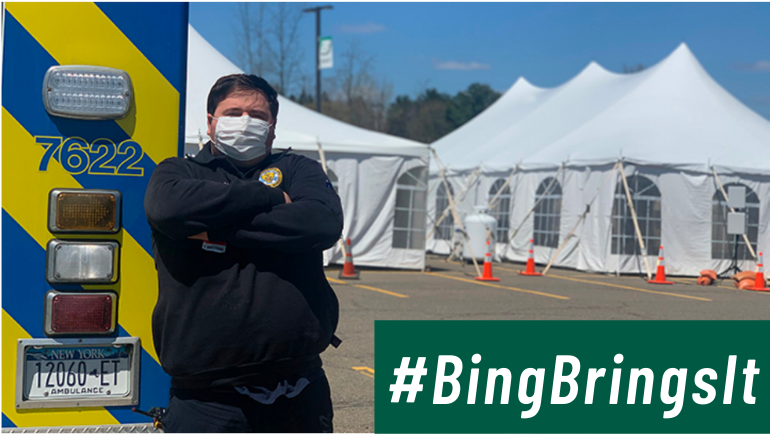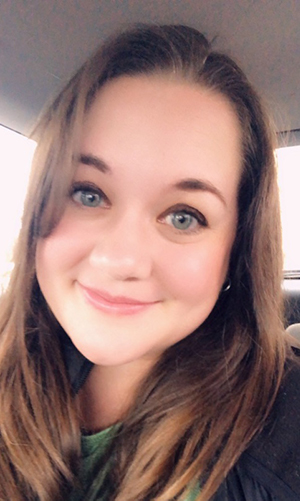Answering the call: Public health students assist community with COVID-19 response

Students from Binghamton University’s Master of Public Health (MPH) program are among the healthcare professionals working to keep the public safe during the COVID-19 outbreak. Two of these students share their experiences performing pandemic-related work outside of their MPH coursework. Both students just completed their first year in the two-year MPH program.
Here are their stories, in their words.
Meet the students
Part-time MPH student Annie DePugh is a registered nurse who has been with UHS for almost seven years. For four years she has been a system director for UHS’ Population Health Management Department. She is expecting her second child in July, and expects to complete the MPH program in fall 2021 or spring 2022.
Max Goldfarb is a full-time MPH student and executive director of Harpur’s Ferry, the student-run ambulance service on Binghamton University’s campus. He joined Harpur’s Ferry in 2015 as an undergraduate, and earned a bachelor’s degree in integrative neuroscience from Harpur College of Arts and Sciences in 2018. Goldfarb expects to finish the MPH program in spring 2021.
Q. What type of COVID-related work are you doing?
DePugh: I’m working in the UHS Medical Command Center, and have been since UHS initiated the Command Center in March. I work alongside our employee health and infection prevention teams to monitor and surveil our workforce. We are communicating with employees who have been in contact with COVID-positive patients or employees and notifying them of these exposures. We also recommend next steps for our employees — self-monitoring symptoms, active surveillance for temperatures and symptoms and COVID diagnostic and/or antibody testing.
Goldfarb: I’m working as a medic at the COVID testing site located at Binghamton University. Harpur’s Ferry is contracted to staff an ambulance the entire time that the testing site is open — seven days a week, 12 hours a day. We are responsible for two major duties: rehabilitation of workers if necessary (performing vital checks, active cooling, medical assessments, etc.) and providing stabilization and transport to the hospital if there is an emergency. This includes the individuals who are coming to get tested and if any of the on-site personnel are having an acute medical emergency. I am in charge of ensuring there are no lapses in Harpur’s Ferry’s coverage.
Q. Have you had contact with people infected with COVID-19 or suspected to be infected with the virus?
DePugh: Yes, by virtue of being in the hospital setting, but no known “direct contact” per the Centers for Disease Control and Prevention/Department of Health definition.
Goldfarb: Covering calls for the University, I have come in contact with a handful of suspected COVID-positive patients. At the testing site we stay out of the “hot zone” and only come in contact with patients if they need transport. Luckily, we have not had to transport any patients from the COVID testing site to date.
Q. How are you protecting yourself?
DePugh: I protect myself by wearing a mask, frequently washing my hands, practicing social distancing and frequently cleaning shared devices/spaces.
Goldfarb: If we come in contact with any suspected cases, we are expected to don complete personal protective equipment (PPE). This includes an N95 respirator, a surgical mask atop the respirator, splash goggles/face shield, full body gown and gloves. Our dispatchers have been exceptionally good about asking the appropriate questions and telling us if airborne precautions are warranted before we arrive on scene. Once on scene we do a 6-foot assessment where we re-ask these questions and ensure that the patients are asymptomatic (with regard to COVID). Even with asymptomatic patients, we still wear the appropriate mask on every call to minimize any potential exposures.
Q. What is the mood in your workplace like?
DePugh: The mood is good; it has largely calmed down after the first few weeks. I’ve had the ability to notify employees when they have come in contact with a patient/employee who has tested positive and the attitude has shifted in a positive direction over the course of the pandemic. A month or so ago those calls elicited a good amount of anxiety and/or concern and fear, whereas now those calls are often received with the employees being already aware and/or suspicious that the positive case was indeed going to test positive for COVID. Everyone is very understanding and abides to the social distancing and mask requirements. We are doing our very best to remain calm, organized, approachable and helpful to the community.
Goldfarb: At the beginning of the pandemic, it was definitely one of fear and anxiety. We were ready to rise to the occasion and help in any way possible; however, New York state had come out with numerous new protocols that indicated it was definitely not business as usual. Luckily, Broome County was not hit particularly hard by COVID, so we quickly rebounded. We were able to quickly implement procedures to ensure both patient and provider safety. We are closely monitoring the state’s and the University’s response and we are ready to react accordingly.
Q. Have you had to make any adjustments in your family life due to working during the pandemic?
DePugh: Yes! My daycare closed. My two-year old has been getting cared for by his grandmother (a retired RN who understands the potential threat that may come with providing child care). My husband has been telecommuting for several weeks for his job working in a different industry. Additionally, I am 32 weeks pregnant and have had to be very cautious of the areas I go in the hospital to preserve the safety of myself and my baby.
Goldfarb: Unfortunately, yes. I would normally be home in Long Island during the summer break, but I have had to stay in Binghamton to ensure that Harpur’s Ferry stays operational 24/7.
Q. Has working during this pandemic changed how you feel about pursuing a degree in public health?
DePugh: It makes me thrilled I’m already in the program! I would be interested to see what uptick there will be in interest in folks pursuing an MPH.
Goldfarb: Working during these times has shown me just how important public health professionals are. To ensure preparedness and emphasize preventative measures is paramount in mitigating future threats to public health. Being able to work alongside individuals who are fighting to do just that inspires me.
Q. Why did you choose to pursue a public health degree?
DePugh: As a registered nurse by training, I have always had a passion for social behavior/community health and felt that the MPH program is an excellent way to further my knowledge and understanding of this science. I think public health is an incredibly important part of our society, and I feel incredibly validated with all the “press” that public health has been getting amid the pandemic!
Goldfarb: My passion for public health stems from experiences in both emergency medical service and entering the workforce after graduation. Experiencing firsthand the struggles many people go through to survive was both humbling and disheartening. I wanted to make a difference in people’s lives but was unsure how. When I discovered the field of public health, I thought that was the best way to become an advocate for these marginalized individuals. At the end of the day I want my life to make an impact on our society for the better and I believe the MPH program sets me up to do just that.
Q. What do you hope to do with your MPH degree once you graduate?
DePugh: I intend to continue on with my current role at my current employer. I would like to see how the MPH education can further broaden my role at UHS with the Population Health Department and also see how it could potentially build (additional) bridges with LCHDs and [the Department of Health]. I have also more recently become interested in seeing how a role in academia could be in my future as I’ve really enjoyed the curriculum at Binghamton University and would love to play a role in Decker College in the future.
Goldfarb: Right now, I am looking to go into emergency management.


